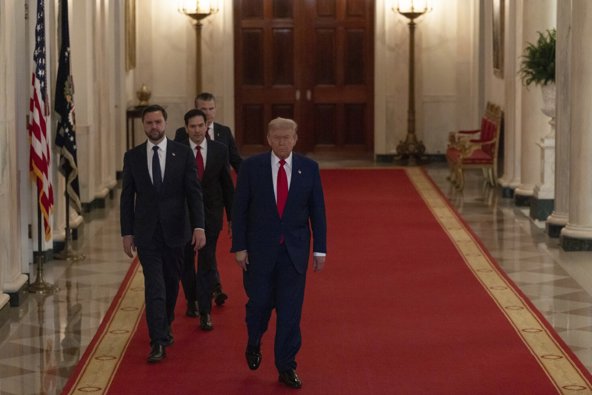
Lawmakers Cautious on Iran Regime Change Amid Ceasefire
Lawmakers back Trump’s ceasefire but warn regime change in Iran must come from within, not U.S. intervention.
Trump’s Diplomacy Underpins Fragile Peace
President Donald Trump’s announcement of a ceasefire between Israel and Iran has set the tone for a tense and uncertain moment in Middle East diplomacy. While many in Congress welcomed the truce as a historic breakthrough, lawmakers voiced serious concerns about its durability and cautioned against any push for U.S.-led regime change in Iran.
After days of escalating military action—including U.S.-supported Israeli strikes targeting Iran’s nuclear program—the ceasefire was reached late Monday. Trump, addressing reporters Tuesday morning, did not shy from the ongoing volatility. “We basically have two countries that have been fighting so long and so hard that they don't know what the f--- they're doing,” he remarked, reflecting frustrations over continued violations by both parties.
On Capitol Hill, Republican and Democratic lawmakers agreed that the United States should not seek to force regime change in Tehran, stressing that any transformation must arise from within Iran. Rep. Jack Bergman, a retired Marine general, succinctly summarized the prevailing sentiment: “It’s not our role.”
Congress Voices Support for Peace but Warns of Challenges
Rep. Nancy Mace, R-S.C., praised the president’s negotiating power, calling him “the only president able to bring Iran and Israel to the table in this manner.” Mace expressed hope that the truce would hold, adding, “If it doesn’t, then we know Trump will act decisively.” Her confidence was echoed by other Republicans who argued that Trump’s strategy of forceful action had forced Iran to the negotiating table.
Sen. Eric Schmitt, R-Mo., credited Trump’s earlier achievements with the Abraham Accords and his recent outreach to Saudi Arabia as laying the groundwork for the ceasefire. “Iran’s conventional weapons have been decimated, their platforms have been decimated, their nuclear program has been obliterated. So they're at the table because of that,” Schmitt noted, suggesting the situation is different now than in past negotiations.
Still, deep skepticism persists. Sen. John Hoeven, R-N.D., warned that “Iran has typically never done what they said they would do,” referencing the country’s poor track record of honoring agreements. He advocated a “trust but verify” approach, drawing on lessons from the Reagan era, and urged close scrutiny of any future arrangements with Tehran.
Sen. Tim Kaine, D-Va., highlighted the historic consequences of American interference in Iranian affairs, citing the 1953 coup as a root cause of decades of mistrust. “Do we really want to get in another regime-change war?” Kaine asked, noting that only the Iranian people—not the U.S.—should decide their government’s future.
Congress Remains Divided on Path Forward
While the majority on Capitol Hill oppose direct U.S. intervention to topple the regime in Tehran, some, such as Rep. Ryan Zinke, R-Mont., advocate a more aggressive posture. Drawing on his military experience, Zinke argued, “I don’t think Iran will bend. I think it’s going to take regime change.”
Despite the division, most lawmakers agree on one point: peace in the Middle East will remain fragile as long as deep-seated mistrust and regional tensions persist. As Rep. Steve Daines, R-Mont., observed, the president’s forceful diplomacy may have set the stage for a “generational shift” in Middle Eastern stability, but the long-term outcome is far from certain.
For now, all eyes are on the region to see whether the truce can endure—and whether Trump’s approach will produce lasting peace or prove to be another fleeting moment in the long and turbulent history of U.S. involvement in the Middle East.






